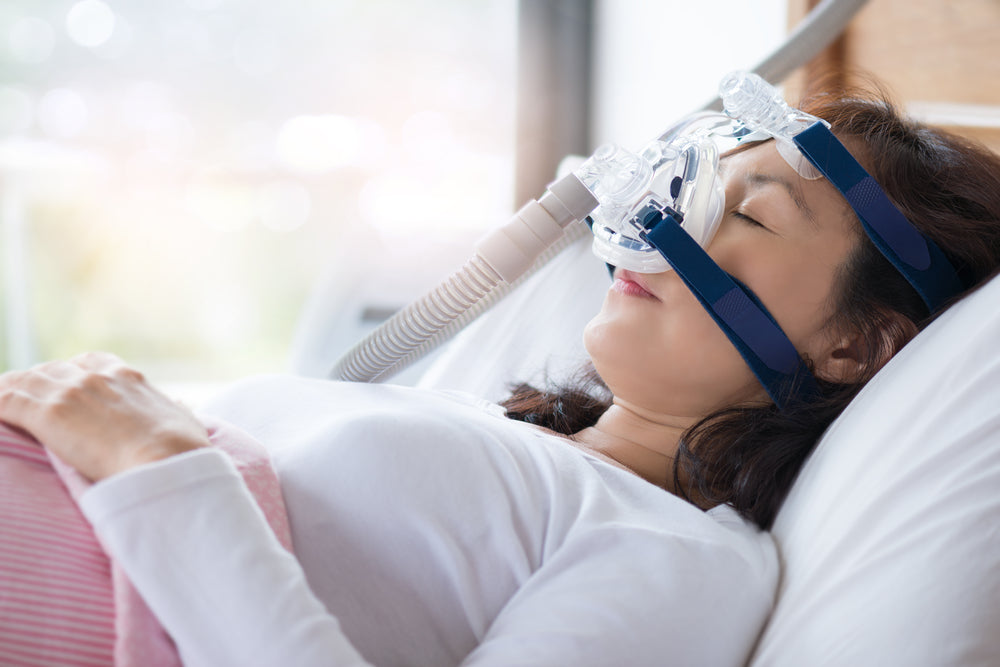Have you ever snored so loud you’ve woken yourself up? What about having a partner or family member tell you that you “snore so loud you could wake the dead”? If you’ve had a snoring problem, then you’re absolutely not alone. Millions of people suffer from chronic snoring but there are several different reasons why. If you were diagnosed with obstructive sleep apnea, or OSA, then you may have been told that your CPAP or AutoPAP mask would eliminate snoring--and it’s true, so long as your mask is working properly!
What Is Snoring?
Snoring happens to everyone at some point and can be as mild as a side effect of a stuffy nose, but it can also have to do with the structure of your individual mouth and nose. Some people have a low, thick soft palate that is more prone to airway obstruction or blockages that can lead to snoring. When you sleep, the muscles in your throat and mouth relax and sag, meaning that smaller palates are more likely to get natural blockages.
It’s also possible that your airway could be blocked by tonsils or adenoids if you’ve never had those removed. If you have had them removed but are still experiencing airway blockages, it could be something as innocuous as a large tongue that relaxes and sags back into the throat during sleep. That’s a big possibility, especially if you’re a frequent back sleeper.
The uvula, or the soft, dangly bit of tissue in the back of your throat, could also be causing airway blockages if it’s enlarged or elongated in some way (e.g. if you’re fighting an infection or virus).
Should a CPAP Stop Snoring?
More often than not, yes your CPAP should stop snoring by applying enough air pressure to keep your airways cleared of anatomical blockages, like those described above. If you are wearing your CPAP correctly and still snoring at night, this is not normal and you should consult your CPAP or AutoPAP provider as soon as possible.
It’s possible that your mask or pressure settings are not being used correctly or are not appropriate to fully solve your airways blockages. But it’s important not to try and solve these problems on your own. Do not adjust your CPAP or AutoPAP settings without speaking to your specialist first!
If you or a partner notices that you are still snoring when wearing your CPAP, be sure to document how often and to what degree you are snoring. This will give your provider more information to work with and allow them to better help alleviate this ongoing problem.
Why Isn’t Your CPAP Stopping Your Snoring?
There are a few main reasons why you may still be snoring while sleeping with your CPAP machine. One, it could be that your pressure settings are not high enough to fully eliminate airway blockages during sleep. Two, it’s possible your mask or hose has air gaps that are releasing air pressure, resulting in lower pressure making into your airways.
Three, it could be as simple as adjusting your sleeping position so as to not kink the hose or compromise the fit of the mask over your face. Lastly, it’s also possible that you don’t have the right mask for your sleeping behaviors--this is especially true if you are a mouth breather. Many will opt for a partial face mask, or nasal pillow, because it will cover less of their face during sleep. However, if you tend to breathe through your mouth at night, this won’t help very much. Mouth breathers should talk to their provider about a full face mask to ensure they are receiving proper CPAP therapy.
Other Ways to Help Solve Snoring
It’s important to consider all aspects of your lifestyle when dealing with an OSA diagnosis as many behaviors could lead to worsening symptoms. There is a well-known link between snoring and obesity because of the extra tissue that can accumulate during weight gain. As you gain weight, you also lose muscle tone, which causes muscles to sag more during sleep. Because sleep apnea can develop as a result of weight gain, weight loss could be a preventative measure, and could actually help you lessen the severity of your OSA.
Another common lifestyle cause of OSA is alcohol consumption. Now, this doesn’t mean having a glass of wine with dinner will cause (or solve) your sleep apnea problems. However, more studies are indicating that late night drinking impacts your sleep by disrupting your sleep patterns, causing you to snore. Not to mention that alcohol is a relaxing agent that causes deep muscle relaxation--increasing the muscles tendency to sag during sleep. If you believe that alcohol could be a contributing factor to your OSA, be sure to talk to a doctor or sleep apnea professional.
Snoring is a problem that can go away if treated correctly, but it’s important to ensure that you try healthy, provider approved methods before taking matters into your own hands. Be sure to consult your doctor or CPAP provider before making any adjustments to your equipment. Remember, when used properly, a CPAP or AutoPAP should eliminate snoring problems. So make sure you’re getting great, snore-free sleep with the correct air pressure settings on your machine.

